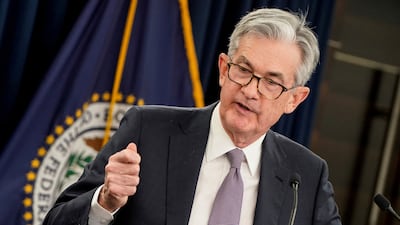Federal Reserve Chairman Jerome Powell has said the US central bank can be “prudent” when cutting interest rates as officials look for more confidence that inflation is moving down.
“We think inflation is coming down. We just want to gain a little more confidence that it's coming down in a sustainable way towards our 2 per cent goal,” he said in an interview on CBS's 60 Minutes.
The interview, broadcast late on Sunday, came before a Labour Department report showed the US economy added a staggering 353,000 jobs last month.
Last week's report showed the jobs market remains strong despite the Fed's interest rates, which stand between 5.25 and 5.50 per cent. Mr Powell ruled out cutting interest rates in March after the Fed's policy decision last week.
When asked by 60 Minutes why the Fed will not issue early rate cuts, Mr Powell said doing so could reaccelerate inflation or hamper the Fed's progress.
“The prudent thing to do is to … give it some time and see that the data continue to confirm that inflation is moving down to 2 per cent in a sustainable way,” he said, referring to the Fed's long-term inflation target.
“I think more likely if you move too soon, you'd see inflation settling out somewhere well above our 2 per cent target. So, we think we can be careful in approaching this decision just because of the strength that we're seeing in the economy.”
The Fed has raised interest rates 11 times since March 2022 to slow the economy without steering it into a recession, otherwise known as a soft landing.
Recent economic data points in the Fed's favour. The central bank's preferred inflation gauge is currently under 3 per cent and the US economy grew by 3.1 per cent in the final quarter of last year.
Still, Mr Powell said the Fed has not achieved a soft landing yet.
“We have work left to do on this. But yes, it is a historically unusual result,” he said.
And risks still remain, he said, highlighting the dangers of keeping rates elevated for too long or cutting them too soon.
Geopolitical risks also pose a threat to the world economy, he said, referring to the wars in Ukraine and the Middle East, and China's economy.
He added that Europe will be greatly affected by the longer shipping times resulting from the crisis in the Red Sea.
“This year has started to look like a better year. But … those are some of the risks in the near term,” the Fed chairman said.
Mr Powell also said the Fed was aware of the potential risk of the conflict spreading that could erode public confidence in the economy, but the central bank does not foresee that yet.


